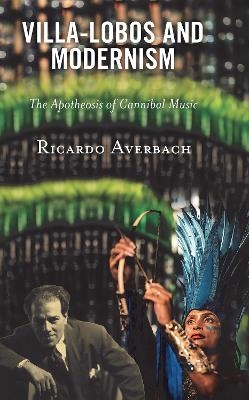
Villa-Lobos and Modernism
The Apotheosis of Cannibal Music
Seiten
2024
Lexington Books/Fortress Academic (Verlag)
978-1-6669-1137-4 (ISBN)
Lexington Books/Fortress Academic (Verlag)
978-1-6669-1137-4 (ISBN)
Ricardo Averbach places Heitor Villa-Lobos as the top exponent of Cultural Cannibalism in music, an aesthetic movement that has been neglected due to traditional Eurocentric views of Modernism. Villa-Lobos and Modernism shows how much our present aesthetics owes to the Modernist ideas introduced by the Brazilian composer.
Villa-Lobos and Modernism: The Apotheosis of Cannibal Music provides a new assessment of the Brazilian composer Heitor Villa-Lobos in terms of his contributions to the Modernist Movement of the twentieth century. In this profound study, Ricardo Averbach elevates Cultural Cannibalism as a major manifestation of the Modernist aesthetics and Villa-Lobos as its top exponent in the music field. Villa-Lobos’s anthropophagic appetite for multiple opposing aesthetics enlightens through the juxtaposition of contradictory elements, leaving a legacy of unmatched originality, a glittering kaleidoscope of sounds that draw from the radical power of Josephine Baker to the outrageous extravagance of Carmen Miranda, from Dada to Einstein’s counterintuitive scientific findings, from folklorism to atonality. The constructed analyses use the works of Stravinsky as a familiar and popular touchstone for accessing Villa-Lobos as the leading exponent of an aesthetic movement that has been neglected due to a traditional Eurocentric view of Modernism. Averbach opens up new possibilities for the study of twentieth-century music, in general, while unveiling how much our present aesthetics owes to the Modernist ideas introduced by the Brazilian composer.
Villa-Lobos and Modernism: The Apotheosis of Cannibal Music provides a new assessment of the Brazilian composer Heitor Villa-Lobos in terms of his contributions to the Modernist Movement of the twentieth century. In this profound study, Ricardo Averbach elevates Cultural Cannibalism as a major manifestation of the Modernist aesthetics and Villa-Lobos as its top exponent in the music field. Villa-Lobos’s anthropophagic appetite for multiple opposing aesthetics enlightens through the juxtaposition of contradictory elements, leaving a legacy of unmatched originality, a glittering kaleidoscope of sounds that draw from the radical power of Josephine Baker to the outrageous extravagance of Carmen Miranda, from Dada to Einstein’s counterintuitive scientific findings, from folklorism to atonality. The constructed analyses use the works of Stravinsky as a familiar and popular touchstone for accessing Villa-Lobos as the leading exponent of an aesthetic movement that has been neglected due to a traditional Eurocentric view of Modernism. Averbach opens up new possibilities for the study of twentieth-century music, in general, while unveiling how much our present aesthetics owes to the Modernist ideas introduced by the Brazilian composer.
Ricardo Averbach is director of orchestral studies at Miami University and past president of the College Orchestra Directors Association.
| Erscheinungsdatum | 10.01.2024 |
|---|---|
| Sprache | englisch |
| Maße | 151 x 229 mm |
| Gewicht | 553 g |
| Themenwelt | Kunst / Musik / Theater ► Musik ► Klassik / Oper / Musical |
| ISBN-10 | 1-6669-1137-2 / 1666911372 |
| ISBN-13 | 978-1-6669-1137-4 / 9781666911374 |
| Zustand | Neuware |
| Haben Sie eine Frage zum Produkt? |
Mehr entdecken
aus dem Bereich
aus dem Bereich
wie wir unsere Musikkultur retten
Buch | Hardcover (2023)
Frankfurter Allgemeine Buch (Verlag)
24,00 €


